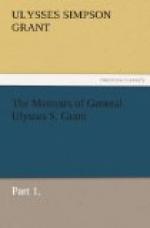The administration had indeed a most embarrassing problem to solve. It was engaged in a war of conquest which must be carried to a successful issue, or the political object would be unattained. Yet all the capable officers of the requisite rank belonged to the opposition, and the man selected for his lack of political ambition had himself become a prominent candidate for the Presidency. It was necessary to destroy his chances promptly. The problem was to do this without the loss of conquest and without permitting another general of the same political party to acquire like popularity. The fact is, the administration of Mr. Polk made every preparation to disgrace Scott, or, to speak more correctly, to drive him to such desperation that he would disgrace himself.
General Scott had opposed conquest by the way of the Rio Grande, Matamoras and Saltillo from the first. Now that he was in command of all the forces in Mexico, he withdrew from Taylor most of his regular troops and left him only enough volunteers, as he thought, to hold the line then in possession of the invading army. Indeed Scott did not deem it important to hold anything beyond the Rio Grande, and authorized Taylor to fall back to that line if he chose. General Taylor protested against the depletion of his army, and his subsequent movement upon Buena Vista would indicate that he did not share the views of his chief in regard to the unimportance of conquest beyond the Rio Grande.
Scott had estimated the men and material that would be required to capture Vera Cruz and to march on the capital of the country, two hundred and sixty miles in the interior. He was promised all he asked and seemed to have not only the confidence of the President, but his sincere good wishes. The promises were all broken. Only about half the troops were furnished that had been pledged, other war material was withheld and Scott had scarcely started for Mexico before the President undertook to supersede him by the appointment of Senator Thomas H. Benton as lieutenant-general. This being refused by Congress, the President asked legislative authority to place a junior over a senior of the same grade, with the view of appointing Benton to the rank of major-general and then placing him in command of the army, but Congress failed to accede to this proposition as well, and Scott remained in command: but every general appointed to serve under him was politically opposed to the chief, and several were personally hostile.
General Scott reached Brazos Santiago or Point Isabel, at the mouth of the Rio Grande, late in December, 1846, and proceeded at once up the river to Camargo, where he had written General Taylor to meet him. Taylor, however, had gone to, or towards Tampico, for the purpose of establishing a post there. He had started on this march before he was aware of General Scott being in the country. Under these circumstances Scott had to issue his orders designating the troops to be withdrawn from Taylor, without the personal consultation he had expected to hold with his subordinate.




